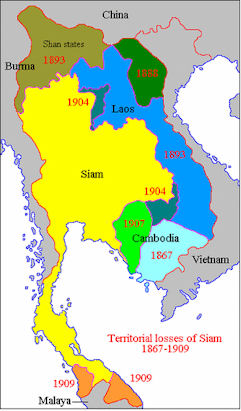

Zitierweise / cite as:
Payer, Alois <1944 - >: Chronik Thailands = กาลานุกรมสยามประเทศไทย. -- Chronik 1993 / B. E. 2536. -- 2. datiert. -- Fassung vom 2017-03-19. -- URL: http://www.payer.de/thailandchronik/chronik1993b.htm
Erstmals publiziert: 2012-10-12
Überarbeitungen: 2017-03-19 [Ergänzungen] ; 2016-11-05 [Ergänzungen] ; 2016-09-04 [Ergänzungen] ; 2016-05-25 [Ergänzungen] ; 2016-04-14 [Ergänzungen] ; 2016-03-17 [Ergänzungen] ; 2016-02-27 [Ergänzungen] ; 2015-12-29 [Ergänzungen] ; 2015-04-04 [Ergänzungen] ; 2014-11-21 [Ergänzungen] ; 2014-11-08 [Ergänzungen] ; 2014-11-01 [Ergänzungen] ; 2014-10-17 [Ergänzungen] ; 2014-09-22 [Ergänzungen] ; 2014-09-14 [Ergänzungen] ; 2014-08-21 [Ergänzungen] ; 2014-08-15 [Ergänzungen] ; 2014-04-10 [Ergänzungen] ; 2013-05-22 [Ergänzungen] ; 2013-04-26 [Aufteilung des Jahrgangs] ; 2013-04-16 [Ergänzungen] ; 2013-04-06 [Ergänzungen] ; 2013-04-01 [Ergänzungen] ; 2013-03-30 [Ergänzungen] ; 2013-03-18 [Ergänzungen] ; 2013-03-09 [Ergänzungen] ; 2013-02-13 [Ergänzungen] ; 2013-01-26 [Ergänzungen] ; 2013-01-13 [Ergänzungen]
©opyright: Dieser Text steht der Allgemeinheit zur Verfügung. Eine Verwertung in Publikationen, die über übliche Zitate hinausgeht, bedarf der ausdrücklichen Genehmigung des Herausgebers.
Dieser Text ist Teil der Abteilung
Thailand von
Tüpfli's Global Village Library
ช้างตายทั้งตัวเอาใบบัวปิดไม่มิด
|
Gewidmet meiner lieben Frau Margarete Payer die seit unserem ersten Besuch in Thailand 1974 mit mir die Liebe zu den und die Sorge um die Bewohner Thailands teilt. |
|
Bei thailändischen Statistiken muss man mit allen Fehlerquellen rechnen, die in folgendem Werk beschrieben sind:
Die Statistikdiagramme geben also meistens eher qualitative als korrekte quantitative Beziehungen wieder.
|
1993-01-01
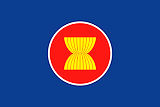
Malaysia und Singapur treten der ASEAN Free Trade Area (AFTA, เขตการค้าเสรีอาเซียน) bei. Diese ist damit die größte Freihandelszone der Welt.
Abb.: Mitgliedstaaten der AFTA (gestrichelt: ab 2012)
[Bildquelle: CIA. -- Public domain]
1993-01-01
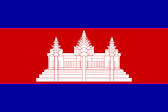
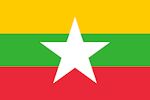
Um den Mörderbanden der Roten Khmer eine wirtschaftliche Grundlage zu entziehen, verbietet Kambodscha die Ausfuhr von Holz. Trotzdem geht der illegale Holzexport nach Thailand mit Unterstützung thailändischer Militärs munter weiter. Es ist ein gutes Geschäft für Militär und andere. Die thailändische Regierung beschließt 17 Grenzübergänge an der birmanischen Grenze wieder zu öffnen, um Thai-Firmen den Import von birmanischem Holz zu ermöglichen.
Abb.: Kambodscha und Myanmar (Burma)
[Bildquelle: CIA. -- Public domain]
1993-01-06

Ministerpräsident Chuan Leekpai (ชวน หลีกภัย, 1938 - ) ist mit einer 88-köpfigen Delegation auf dreitägigem Staatsbesuch in Malaysia. Chuan wird von den malaysischen Medien als "Mr Nice Guy" bezeichnet.
1993-01-20 - 2001-01-20

William Jefferson "Bill" Clinton (1946 - ) ist Präsident der USA
Abb.: Bill Clinton
[Bildquelle: DonkeyHotey. -- http://www.flickr.com/photos/donkeyhotey/6358422543/. -- Zugriff am 2013-05-22. -- Creative Commons Lizenz (Namensnennung)]First Cat der USA ist Socks Clinton (1989 - 2009)
Abb.: Socks Clinton
[Bildquelle: Barbara Kinney/The White House/Wikimedia. -- Public domain]
1993-01-20 - 1997-01-17

Warren Christopher (1925 - 2011) ist US Secretary of State (Außenminister).
Abb.: Warren Christopher
[Bildquelle: US Government / Wikipedia. -- Public domain]
1993-01-21
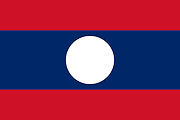
Thai Popsänger Uthen "Teh" Prommin (อุเทน "เท่ห์" พรหมมินทร์, 1973 - ) nennt in einer Thai-Fernsehshow laotische Frauen "dumm und schmutzig". Laoten fordern eine Entschuldigung durch den Sänger sowie durch die thailändische Botschaft in Laos. Der Sänger dementiert, obwohl viele seine Bemerkung gehört haben.
Künstlerlink auf Spotify:
URI: spotify:artist:6hTBp1RWlfKVSPKBX1DzTD
URL: https://open.spotify.com/artist/6hTBp1RWlfKVSPKBX1DzTD
Abb.: Cover
[Bildquelle: th.Wikipedia. -- Fair use]
1993-01-26
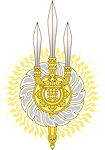
Prinzessin Chulabhorn (จุฬาภรณวลัยลักษณ์) unterstützt den umstrittenen Vorschlag, dass in Thailand Impfstoffe gegen AIDS an Menschen getestet werden.
1993-01-26
In Nakhon Nayok (นครนายก) wird mit Charatsri Teepirach (จรัสศรี ทีปิรัช, 1939 - ), die erste Provinz-Gouverneurin Thailands ernannt.
Abb.: Lage der Provinz Nakhon Nayok (นครนายก)
[Bildquelle: OpenStreetMap. -- Creative Commons Lizenz (Namensnennung, share alike)]
Abb.: Charatsri Teepirach (จรัสศรี ทีปิรัช)
[Bildquelle: th.Wikipedia. -- Public domain]
1993-01-28
Abb.: Sanitsuda Ekachai (สนิทสุดา เอกชัย)
[Bildquelle: FAO]Bangkok Post: Sanitsuda Ekachai (สนิทสุดา เอกชัย, 1955 - ): "Teacher with a mission"
Vor 10 Jahren hat die damals 14jährige Jandraem Sirikhampoo in Mae Sai (แม่สาย), Provinz Chiang Rai (เชียงราย), begonnen, in ihrem Haus Hilltribe-Kindern Lesen und Schreiben beizubringen. Jandraem selbst hat nur vier Jahre Grundschule (ประถม, Prathom) besucht. Ihre Schüler sind inzwischen über 100 "illegale" Hilltribe Kinder, vor allem Akha (อาข่า), Tai Yai (Shan, တႆးယႂ်ႇ) und Birmanen. Sie haben keine Geburtsdokumente und dürfen darum keine staatlichen Schulen besuchen. Die Schule lebt von Spenden. Fast alle Mädchen werden im Alter von 10 (!) bis 13 Jahren an Zuhälter und Bordellbesitzer zur Prostitution verkauft. Kaufpreis für eine 10järige: 5000 Baht. Die Geschichte jedes Kinds ist dieselbe: Vernachlässigung und Misshandlung durch die Eltern. Viele Eltern sind Alkoholiker und lassen ihre Wut an den Kindern aus.
Viele Kinder leben nicht bei ihren leiblichen Eltern. Manche werden über die Grenze geschmuggelt, um den Markt für Kinderprostitution zu befriedigen. Andere Kinder werden gekauft und so lange großgezogen, bis sie mit 10 bis 13 Jahren reif sind für den Prostitutionsmarkt.
"There are a lot of jobs for boys in Mae Sai which offer on-the-job training, such as car mechanics and gem-cutting. For girls, it's only prostitution."
Fast alle Schulkameradinnen Jandraems wurden Prostituierte. Jandraem wollte nicht.
"Parents tend to think that their girls have a comfortable working life. But my friends told me otherwise. Theya confidet in me all their problems. They told me not to go. I can well understand the eldest daughter's obligation to her family. With our cultural emphasis on a daughter's gratitude, I can understand why the girls under our care will have to comply if their parents ask them to make money in the flesh trade. But I also understand the crucial role of families from my own experience. I never got the same pressure from my parents that my friends got from theirs. Had it not been so, I would have had to face a tough decision."
Abb.: Lage von Mae Sai (แม่สาย)
[Bildquelle: OpenStreetMap. -- Creative Commons Lizenz (Namensnennung, share alike)]
Abb.: Hoffentlich werden sie nie verkauft: Akha (อาข่า), Provinz Chiang Rai (เชียงราย), 2007
[Bildquelle: Agustín Hernández Campillejo. -- http://www.flickr.com/photos/valkie/1058907877/. -- Zugriff am 2012-05-10. -- Creative Commons Lizenz (Namensnennung, keine kommerzielle Nutzung, keine Bearbeitung)]
1993-02-01
Ab heute gilt in Bangkok Helmpflicht für Motorradfahrer. Die Helme müssen offiziell zugelassen sein. Bei Zuwiderhandlung drohen 500 Baht Strafe (bzw. 100 Baht Schmiergeld an den Polizisten).
1993-02-02

Seine Majestät, der König erhält vom Departement of Intellectual Property das thailändische Patent für den "Low speed surface aerator (Chaipattana aerator, กังหัน
น้ำ ชัย พัฒนา).
Abb.: Chaipattana aerator (กังหันน้ำ ชัย พัฒนา)
[Bildquelle: http://www.rid.go.th/eng/Water%20Treatment%20Work.htm. -- Zugriff am 2011-12-03. -- Fair use]
Abb.: Chaipattana aerator (กังหันน้ำ ชัย พัฒนา)
[Bildquelle: http://www.rid.go.th/eng/Water%20Treatment%20Work.htm. -- Zugriff am 2011-12-03. -- Fair use]
1993-02-05 - 1995-01-10

R. James Woolsley Jr. (1941 - ) ist Direktor des CIA.
Abb.: R. James Woolsley
[Bildquelle: CIA / Wikipedia. -- Public domain]
1993-02-08
Eine Untersuchungskommission der Thai-Armee stellt fest, dass mit dem Kauf von 106 leichten US-Kampfpanzern "Stingray" Schrott eingekauft wurde. 44 der Panzer hatten am Geschützturm Risse entwickelt. Es ist klar, dass beim Kauf der Panzer Provisionen für Generäle und andere eine größere Rolle gespielt haben als die militärische Brauchbarkeit.
"The original Stingray program was launched in 1983, with the first prototype vehicle ready in August 1984. As of 2004, the only country to have purchased the Stingray is Thailand, which ordered approximately 100 tanks that were delivered between 1988-1990." [Quelle: http://en.wikipedia.org/wiki/Stingray_light_tank. -- Zugriff am 2011-12-16]
1993-02-09
Ein Bewohner Bangkoks schaltet die Gerichte in Geistervertreibung ein: in einem Nachbarhaus wird rechtswidrig ein Leichnam in einem extra dafür erbauten Raum aufbewahrt. Seither heulen und bellen die Hunde in der Nacht (sie sehen ja Geister) und der Kläger selbst hat einen Geist in Form einer alten Frau bei seinem Haus herumstreichen gesehen. Die Nachbarn verletzen Artikel 10 und 25 des Cemetery and Funeral Act von 1986.
1993-02-17

Eine Gruppe von Friedens-Nobelpreisträgern startet in Bangkok eine Kampagne zur Freilassung der in Burma unter Hausarrest stehenden Oppositionspolitikerin und Friedens-Nobelpreisträgerin Aung San Suu Kyi (အောင်ဆန်းစုကြည်, 1945 - ). Die Gruppe reist auch zur birmanischen Grenze und trifft dort birmanische Dissidenten. Kurz nach Abreise der Nobelpreisträger verkündet Ministerpräsident Chuan, dass Thailand Myanmar nicht isolieren und nicht beleidigen werde. Burmas Außenminister bestätigt, dass das Nobelpreisträger-Treffen die Beziehungen Burmas zu Thailand nicht berühre. Unter den anwesenden Nobelpreisträgern ist auch der Dalai Lama, was China natürlich beanstandet. Die thailändische Regierung betont, dass dies zeige, dass Thailand wirklich an Menschenrechten interessiert sei [sic!].
1993-02-22
Thailand verschärft die Maßnahmen gegen illegale Immigranten. Gemeint sind damit vor allem Birmanen, Chinesen und Bergvölker. Viele liefern Nachschub für die in Thailand boomende Prostitution. Nach Schätzungen halten sich in Thailand über 100.000 illegale Immigranten auf.
1993-02-23
1993-02-24Nach einem Bericht der Mahidol University (มหาวิทยาลัยมหิดล) werden immer noch 52 Opfer des Black May 1992 (Thai: พฤษภาทมิฬ) vermisst. Die Angehörigen fordern die Bestrafung der Verantwortlichen. Durch die Brutalität des Militärs am Black May Verletzte fordern Schadensersatz.
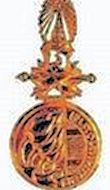
Zu National Artists (ศิลปินแห่งชาติ) werden ernannt:
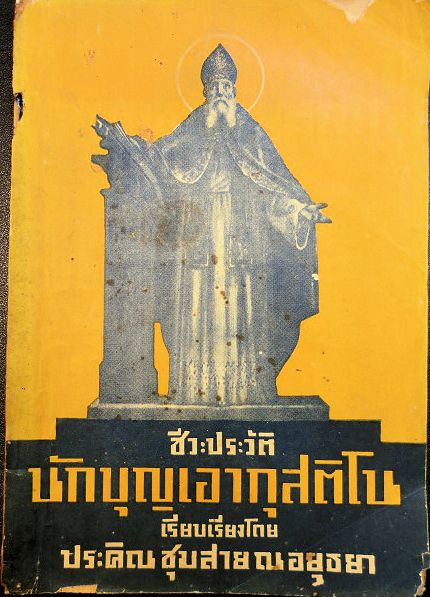
Abb.: Einbandtitel eines Buchs von Prakhin Xumsai Na Ayudhya (นางประคิณ ชุมสาย ณ
อยุธยา = อุชเชนี = นิด นรารักษ์)
[Fair use]
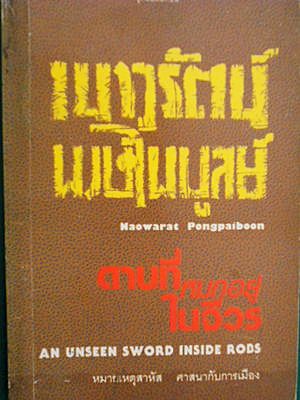
Abb.:
Einbandtitel eines Buchs von Naowarat Pongpaiboon (นายเนาวรัตน์ พงษ์ไพบูลย์)
[Fair use]
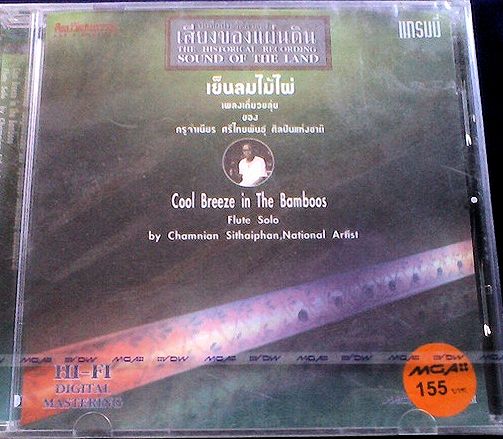
Abb.:
CD-Titel von Jamnian Srithaipan (นายจำเนียร ศรีไทยพันธุ์)
[Fair use]
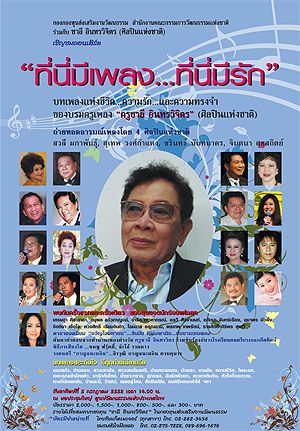
Abb.: Plakat
für Chalee Intharawijit (นายชาลี อินทรวิจิตร)
[Fair use]
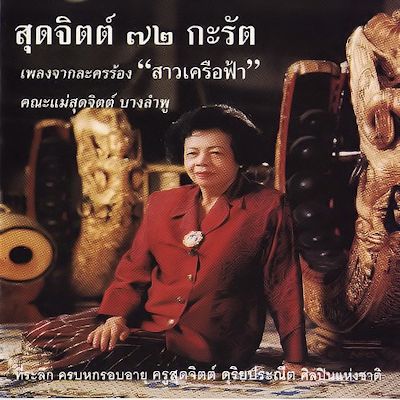
Abb.: CD-Titel von Sudchit Anantakul (นางสุดจิตต์ อนันตกุล)
[Fair use]
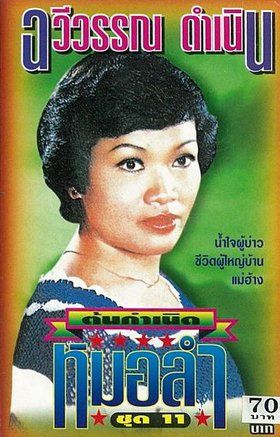
Abb.: Kassetten-Titel von Chaweewan Phanthu (ฉวีวรรณ พันธุ = ฉวีวรรณ
ดำเนิน - Chaweewan Damnoen)
[Fair use]
1993-02-27
Die Bangkok Post nennt Banharn Silpa-archa (บรรหาร ศิลปอาชา, 1932 - ) "the guru of back-room maneuvering to divert government funds to Suphan Buri."
Abb.: Lage der Provinz Suphan Buri (สุพรรณบุรี)
Bildquelle: [Bildquelle: CIA. -- Public domain]
1993-03-06
Gewaltsamer Kampf zwischen Befürwortern und Gegnern des Pak Mun Staudamms (เขื่อนปากมูล)
Abb.: Lage des Pak Mun Staudamms (เขื่อนปากมูล)
[Bildquelle: OpenStreetMap. -- Creative Commons Lizenz (Namensnennung, share alike)]
"The Pak Moon controversy finally boiled over the following year. Beginning on February 27, in a last-ditch bid to stop the project (which by then was already half-way complete), or at least to negotiate better compensation, a group of local villagers and students staged a sit-in at the dam site and brought construction to a halt. There they stayed for a week, hoping that the new democratically elected government led by Chuan would be more sympathetic to their plight. But Savit Bhotivihok [สาวิตต์ โพธิวิหค, 1945 - ], the Cabinet officer who oversaw EGAT [Electricity Generating Authority of Thailand - การ ไฟฟ้าฝ่ายผลิตแห่งประเทศไทย], declined to get involved. Negotiations with the local authorities dragged on and tensions mounted. Finally, on the night of March 6, the dispute turned violent. Trouble began when a group of "dam supporters"—either a hired mob, or a group of construction workers angry because they were losing their pay, or perhaps both—gathered near the protestors. There are conflicting accounts of what happened next. Suphon Sriphon, a Nation radio reporter covering the story, says that starting at around 11:00 P.M., the pro-dam crowd started hurling rocks at the anti-dam protestors, and the police were caught in the middle. Some of the dam’s opponents sought to attack the stone throwers and ran into the police. "The police didn’t hit the pro-dam demonstrators with batons at all. Instead, they mixed themselves with this group and beat the anti-dam protestors. EGAT wanted [them] out, and it may have been behind the dam supporters," Suphon said.
Thongcharoen Srihadhamma, a fifty-year-old local leader of the protestors, said he didn’t know who started the fighting. He came out of a meeting with EGAT to find his fellow villagers up in arms, shouting at the dam supporters: "Stop the dam! We don’t want it!" He tried to calm them down, but suddenly the two sides were throwing stones and firing slingshots at each other. The clash left about forty people injured. Thongcharoen and other protesters leaders were arrested. According to Police Major Wichian Pulsap, commander of the local police force, "The demonstration had to be dispersed because it obstructed the work of the construction company which was losing a million baht a day due to the work suspension." Construction continued and the project was completed the following year."
[Quelle: Fahn, James David <1965 - >: A land on fire : the environmental consequences of the Southeast Asian boom. -- Boulder : Westview, 2003. -- 365 S. ; 24 cm. -- ISBN 0-8133-4267-8. -- S. 95f.. -- Fair use]
1993-03-15

Beginn des Nationalen Volkskongresses (全国人民代表大会) Chinas. In einer Verfassungsänderung wird die Wirtschaft Chinas als "sozialistische Marktwirtschaft" (社会主义市场经济) definiert.
1993-03-16
Gründung der Inter Mountain Peoples Education and Culture in Thailand Association (IMPECT - สมาคมศูนย์รวมการศึกษาและวัฒนธรรมของขาวไทยภูเขาในประเทศไทย (ศ.ว.ท.))
Abb.: ®Logo
"Inter Mountain Peoples Education and Culture in Thailand Association or IMPECT is an indigenous non-governmental development organisation founded and staffed entirely by representatives of the indigenous groups and networks involved in the Association. IMPECT originated from a project run under the Mountain Peoples Cultural Education and Development Foundation (MPCD). In 1991 the Inter Mountain Peoples Education and Culture in Thailand Project became an independent organisation. IMPECT gained official registration as an Association in its own right on 16 March 1993. The Association focuses on development work within the populations of ten indigenous groups residing in the highlands of the northern provinces of Thailand: the Akha, Dara-ang, Hmong, Kachin, Lahu, Lisu, Lua, Karen, Mien and Shan peoples.
The Association works with a variety of Indigenous Peoples sharing similar situations and experiences, applying traditional knowledge and practices to all aspects of development work. IMPECT works as an association, providing opportunities for participation and ownership of development activities to representatives of the different indigenous groups. The four main areas of action are: Cultural Revival and Alternative Education, Promotion of the Environment and Natural Resource Management, Enhancement of Indigenous Peoples' Movements and Networks and Indigenous Peoples' Rights."
[Quelle: http://www.forestpeoples.org/partners/inter-mountain-peoples-education-and-culture-thailand-association-impect. -- Zugriff am 2016-05-25. -- Fair use]
1993-03-20
ไทยรัฐ (Thai Rath):
"Hooded Lahu [ชาวมูเซอ / ชาวล่าหู่] bandits close river, strip foreign tourists one by one of over 500,000. Armed Lahu bandits boldly destroyed the image of Thai tourism by donning camouflage uniforms and hoods and robbing 27 foreign tourists of over 500,000 baht while nature rafting along the river. The tourists and guide, frightened by warning shots, jumped into the river and fled through the forest to notify the Chiangmai police. The police launched a ground search aided by helicopter reconnaissance and expect to round up the entire group. The incident occurred on the 18th of March 1993."
". . . the guide reported that the bandits spoke with a Lahu tribal accent. . . Investigators hurriedly reported to Police Colonel Pichit Eumsa-nguan, Chief of Chiangmai Police, who ordered a combined manhunt by land and air. . . because this incident seriously destroyed the atmosphere of tourism in the province, and they were certain to apprehend the Lahu bandits in a short time. "
[Übersetzt von Prasith Leepreecha [ประสิทธิ์ ลีปรีชา]. -- In: Development or domestication? : indigenous peoples of Southeast Asia / ed. Don N McCaskill ; Ken Kampe. -- Chiang Mai : Silkworm Books, 1997. -- 631 S. : Ill. ; 21 cm. -- ISBN 974-7100-33-9. -- S. 268f.]
1993-03-26
Der Oberste Gerichtshof erklärt die Beschlagnahmung des Vermögens früherer Minister des Kabinetts von Gen Chatichai Choonhavan (ชาติชาย ชุณหะวัณ) für verfassungswidrig. Die Beschlagnahmung hatte stattgefunden aufgrund von Order Nr. 26 des National Peacekeeping Council (คณะรักษาความสงบเรียบร้อยแห่งชาติ).
1993-04

Das Militär brandschatzt zwei Flüchtlingslager (Democracy Village, Aung Tha Pye) mit Flüchtlingen aus Myanmar. 500 Flüchtlinge werden obdachlos.
1993-04
Gründung des Thailand Research Fund (TRF) (สำนักงานกองทุนสนับสนุนการวิจัย (สกว.))
Abb.: ®Logo
1993-04-02
"Friends of Anand" demonstrieren zur Unterstützung des früheren Ministerpräsidenten Anand Panyarachun (อานันท์ ปันยารชุน), der der Korruption angeklagt ist. Später wird die Anklage zurückgenommen.
1993-04-08
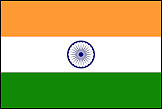
Staatsbesuch des indischen Ministerpräsidenten P. V. Narasimha Rao (Pamulaparthi Venkata Narasimha Rao; పాములపర్తి వెంకట నరసింహారావు, 1921 - 2004). Der Ministerpräsident eröffnet das India Study Centere (ศูนย์อินเดียศึกษา) an der Thammasat University (มหาวิทยาลัยธรรมศาสตร์). Indische Geschäftsleute in Thailand spenden 10 Mio. Baht Kapital. Von den Zinsen dieses Kapitals wird das Centre betrieben.
1993-04-09
Feierliche Eröffnung des United Nations' Conference Centre in Bangkok, des Sitzes der Economic and Social Commission for Asia and the Pacific (UNESCAP or ESCAP).
Abb.: Lage des United Nations' Conference Centre
[Bildquelle: OpenStreetMap. -- Creative Commons Lizenz (Namensnennung, share alike)]
Abb.: UN Conference Centre Bangkok, 2011
[Bildquelle: Adopt A Negotiator. -- http://www.flickr.com/photos/adoptanegotiator/5584827756/. -- Zugriff am 2011-12-16. -- Creative Commons Lizenz (Namensnennung, keine kommerzielle Nutzung)]
"Die Wirtschafts- und Sozialkommission für Asien und den Pazifik der Vereinten Nationen (englisch: United Nations Economic and Social Commission for Asia and the Pacific) ESCAP oder UNESCAP - ist eine Kommission der Vereinten Nationen für Ostasien und den Pazifik mit Sitz in Bangkok. Die Aufgaben der Wirtschafts- und Sozialkommission für Asien und den Pazifik sind unter anderem das Vorantreiben von wirtschaftlicher und sozialer Entwicklungshilfe in den 62 Mitgliedsstaaten, von denen 9 nicht Mitglied der Vereinten Nationen sind."
[Quelle: http://de.wikipedia.org/wiki/Wirtschafts-_und_Sozialkommission_f%C3%BCr_Asien_und_den_Pazifik. -- Zugriff am 2011-12-16]
1993-04-22
30 Thais mit Beziehungen zu höchsten Regierungsstellen werden beschuldigt die Börsen-Aktienkurse mehrerer thailändischer Firmen manipuliert zu haben. Sie sollen dabei Gewinne von insgesamt $400 Mio. gemacht haben.
1993-04-27
ข่าวไทย (Thai News):
"Armed tribal bandits rob 19 foreign tourists one by one Three daring tribal bandits armed with shotguns robbed 19 tourists on a jungle rafting tour, then fled with over 100,000 baht into the forest. Local police, assisted by the Border Patrol Police and a helicopter, mounted an immediate manhunt and expressed confidence at their capture. This was the second incident to occur in Mae Taeng District, Chiangmai.""
". . . Police Lieutenant Colonel Wim Benjawan [เบญจวรรณ], Chief Detective, told reporters that he believed the bandits were Lahu tribesmen [ชาวมูเซอ / ชาวล่าหู่], even though they wore military camouflage uniforms. All were thin and looked like opium addicts. During the robbery they wore knitted masks covering their faces. One of the bandits wore white Nike shoes with an orange stripe."
[Übersetzt von Prasith Leepreecha [ประสิทธิ์ ลีปรีชา]. -- In: Development or domestication? : indigenous peoples of Southeast Asia / ed. Don N McCaskill ; Ken Kampe. -- Chiang Mai : Silkworm Books, 1997. -- 631 S. : Ill. ; 21 cm. -- ISBN 974-7100-33-9. -- S. 268f.]
1993-04-27
Ab jetzt bekommen Frauen nach der Geburt 90 Tage Schwangerschaftsurlaub. Die ersten 45 Tage muss der Arbeitgeber bezahlen, die restlichen 45 Tage der Social Security Fund.
1993-04-29
Abb.: Sanitsuda Ekachai (สนิทสุดา เอกชัย)
[Bildquelle: FAO]Bangkok Post: Sanitsuda Ekachai (สนิทสุดา เอกชัย, 1955 - ): "A thorn in their side"
Über die Bäuerin Pornpet Meuansri (พรเพชร เหมือนศรี, 1937 - 2004) aus Nakhon Sawan (นครสวรรค์). Ihr Land und das anderer Bauern in Tambon Nong Klap (หนองกลับ), Amphoe Nong Bua (หนองบัว), Nakhon Sawan (นครสวรรค์), wurde enteignet. Sie hat dagegen jahrelang zusammen mit einem Wasserbüffel vor dem Regierungsgebäude in Bangkok demonstriert. Als alles nichts nützte, übergoss sie sich mit Benzin und zündete sich an. Die Polizei griff ein, man erklärte sie für verrückt und lieferte sie in eine Nervenklinik ein. Schließlich erklärte 1988 das Kabinett, dass ihr Land zu unrecht enteignet worden war und ihrer Familie und den anderen Bauern ihres Dorfes das Land zurückgegeben werden muss. In der Zwischenzeit hatten die Behörden anderen Bauern erlaubt Pornpets Land in Besitz zu nehmen. Sie hat nun zwar das Recht auf ihr Land, muss aber gegen die gegenwärtigen Besitzer prozessieren, um ihr Land auch wieder in Besitz nehmen zu können.
"The bureaucracy no longer works. It simply refuses to move. Officials always say it is others' responsibility and there's nothing they can do. You can't imagine how much effort I have made to push them into doing anything at all. They never help me with information, necessary paperwork, or advice. I have to seek these myself to prove my case. But that is relatively minor. The horror is how far they are willing to go to abort my case."
"once you're government, you immediately become bureaucracy. Once in the government, politicians listen no longer to the people but to the bureaucrats."
"I voiced my opinions but my parents always said it was the business of phu yai (ผู้ใหญ่, Großkopfete), not of dek dek (เด็กเด็ก), girls like us."
Abb.: Lage von Nong Klap (หนองกลับ)
[Bildquelle: OpenStreetMap. -- Creative Commons Lizenz (Namensnennung, share alike)]
1993-04-29
The Nation: Laut Anita Pleunarom braucht ein Golfplatz in Thailand täglich im Durchschnitt 3000 m³ Wasser. Diese Wassermenge genügt, um ein Dorf mit 2000 Einwohnern zu versorgen.
"Prostitution has become a common part of the Thai golf course business," claims Pleunarom. "In Japan, the sex trade and golfing are the same business." [Zitiert in: Fahn, James David <1965 - >: A land on fire : the environmental consequences of the Southeast Asian boom. -- Boulder : Westview, 2003. -- 365 S. ; 24 cm. -- ISBN 0-8133-4267-8. -- S. 55]
1993-05 - 2004-12

Die Bundesrepublik Deutschland unterstützt den Aufbau des Technologie-Transfer-Zentrums Thai-German Institute (TGI, สถาบันไทย-เยอรมัน)
Abb.: ®Logo
"The Thai-German Institute is a joint initiative of the Government of the Kingdom of Thailand and the Government of the Federal Republic of German, the aim was to be an effective training center for transferring advanced manufacturing technology to Thai industry. It was set up as an autonomous body outside the formal education system with it's operation under the supervision of the Foundation for Industrial Development and a broad oversight by the Ministry of Industry." [Quelle: http://www.tgi.or.th/about.php?tr_id=1. -- Zugriff am 2015-12-29]
1993-05-08
ข่าวไทย (Thai News):
"Chiang Mai orders strict control of tour companies to control danger to tourists on jungle tours" Police Major Pittaya Sirirak [พิทยา ศิริรักษ์], Chiangmai Tourist Police Detective, told reporters that in order to protect foreign tourists on the popular jungle tours in Chiangmai directions for the operation of such tours by the companies involved have been laid down. Companies will henceforth be required to register tourist groups with the Tourist Police, stating the name of the company, guide and tourists, route and timing. They will also be required to report to local police in any area entered so that authorities can provide protection for the tour."
[Übersetzt von Prasith Leepreecha [ประสิทธิ์ ลีปรีชา]. -- In: Development or domestication? : indigenous peoples of Southeast Asia / ed. Don N McCaskill ; Ken Kampe. -- Chiang Mai : Silkworm Books, 1997. -- 631 S. : Ill. ; 21 cm. -- ISBN 974-7100-33-9. -- S. 270.]
1993-05-10
Bei einem Großfeuer in der Kader Industrial Factory in Nakhon Pathom (นครปฐม), ein Hersteller von Puppen, kommen 188 Personen um und 469 werden verletzt. Die Notausgänge waren verriegelt, "um Diebstahl zu verhindern". An Kader beteiligt ist die Chearavanont-Familie (เจียรวนนท์, CP Group - เครือเจริญโภคภัณฑ์) (Greider (2009), S. 616).
Abb.: Lage von Nakhon Pathom (นครปฐม)
[Bildquelle: OpenStreetMap. -- Creative Commons Lizenz (Namensnennung, share alike)]
"The Kader Toy Factory fire was a fire on 10 May 1993 at a factory in Thailand. It is considered the worst industrial factory fire in history. 188 people were killed, and over 500 were seriously injured. Most of the victims were young female workers from rural families. More people were killed than in the Triangle Shirtwaist Factory fire; despite this, the incident received little media attention outside Thailand. The factory was owned by the Charoen Pokphand (CP, เครือเจริญโภคภัณฑ์) Group, a Thai transnational corporation and one of Asia's largest agribusiness firms. Fire
The Kader toy factory manufactured stuffed toys and licensed plastic dolls primarily intended for export to the United States and other developed countries. The toys were produced for Disney, Mattel and others. The factory is located in the Sam Phran District of Nakhon Pathom Province (นครปฐม). The structures that were destroyed in the blaze were all owned and operated directly by Kader, which owns the site. Kader has two sister companies that also operate at the location on a lease arrangement.
The factory was poorly designed and built. Fire exits drawn in the building plans were not in fact constructed, and the existing external doors were locked. Furthermore, the building was reinforced with un-insulated steel girders which quickly weakened and collapsed when heated by the flames.
At about 4 PM on May 10th, 1993, a small fire was discovered on the first floor of part of the E-shaped building. Workers were instructed to keep working wherein the fire was said to be minor. The fire alarm in this building did not sound. This part of the building was dedicated to the storage of finished products and the fire spread quickly. Other parts of the factory were full of raw materials which also burned very fast.
Workers in the first building who tried to escape found the ground floor exit doors locked, and the stairwells soon collapsed. Many workers jumped from the second-, third-, and fourth-floor windows in order to escape the flames, resulting in severe injuries or death.
Firefighters arrived at the factory at about 4:40 PM, to find Building One about to collapse.
Fire alarms in buildings Two and Three had sounded and all the workers were able to escape.
AftermathMost victims were taken by ambulance to the Sriwichai II Hospital (โรงพยาบาลศรีวิชัย 2), where 20 of them died. When the northern stairwell of the collapsed building was searched, the bodies of many others were found. These victims died of smoke inhalation, the flames, or the ultimate collapse of the building.
The Kader fire has created a great deal of interest about the country's fire safety measures, particularly its building code design requirements and enforcement policies. Thai Prime Minister Chuan Leekpai, who travelled to the scene on the evening of the fire, has pledged that the government will address fire safety issues. According to the Wall Street Journal (1993), Leekpai has called for tough action against those who violate the safety laws. Thai Industry Minister Sanan Kachornprasart (สนั่น ขจรประศาสน์) is quoted as saying that “Those factories without fire prevention systems will be ordered to install one, or we will shut them down”.
The Wall Street Journal goes on to state that labour leaders, safety experts and officials say that the Kader fire may help tighten building codes and safety regulations, but they fear that lasting progress is still far off as employers flout rules and governments allow economic growth to take priority over worker safety.
Media referencesNew Zealand singer-songwriter Don McGlashan released a song about the disaster, Toy Factory Fire, on his 2006 album Warm Hand. The song is narrated from the imagined perspective of a New York-based toy company executive who, in the week of the 10th anniversary of the fire, is looking at a number of photographs of the disaster's aftermath. "Here's Bart Simpson with his arms all melted and twisted," he begins. And later: "They said it was a death trap from a text book... Keeping them [the photos] hidden was the best work I ever did.""
[Quelle: http://en.wikipedia.org/wiki/Kader_Toy_Factory_fire. -- Zugriff am 2011-12-16]Der amerikanische Journalist William Greider (geb. 1936) kommentiert scharfsinnig:
"Der Brand in Thailand dagegen löste keine größeren politischen Reaktionen geschweige denn Betroffenheit unter den Verbrauchern aus. Die Gleichgültigkeit der führenden amerikanischen Blätter spiegelte lediglich die Haltung ihrer Leser wider, die vielleicht noch von menschlichem Leid in ihrem engeren sozialen Umfeld gerührt werden konnten, für Meldungen über die sich alltäglich ereignenden Katastrophen irgendwo auf der Welt schon zu abgebrüht waren. Ein Brand in Bangkok war so etwas Ähnliches wie ein Taifun in Bangladesch oder ein Erdbeben in der Türkei. Für die Amerikaner hätte der Brand in Bangkok vielleicht mehr Bedeutung gewonnen, wenn sie die unzähligen rußverschmierten Puppen zwischen den Trümmern gesehen hätten - makabrer Abfall, der zwischen den Toten herumlag. Bugs Bunny, Bart Simpson und die Muppets. Big Bird und andere Puppen aus der Sesamstraße. In den ersten Meldungen stand nichts davon, dass die Fabrik in Thailand die meisten Spielzeugwaren für amerikanische Unternehmen produzierte - Toys "Я" Us, Fisher-Price, Hasbro, Tyco, Arco, Kenner, Gund und J. C. Penney - sowie Stoffpuppen, Hausschuhe und Souvenirs für Europa.
Die globalisierte Kultur hat eine sonderbare Beschränktheit im Charakter der Amerikaner aufgedeckt: Sie beschäftigten sich geradezu besessen mit der Sicherheit ihrer Kinder, und die US-Regierung schreibt bis ins kleinste Detail vor, wie Spielzeug auszusehen hat, damit sich die Kinder nicht verletzen. Aber weder die US-Bevölkerung noch ihre Regierung interessieren sich dafür, welche brutalen und gefährlichen Bedingungen den Menschen aufgezwungen werden, die dieses Spielzeug herstellen und von denen viele selbst noch halbe Kinder sind. Sowohl in Washington als auch in Bangkok wurde davon ausgegangen, dass es keine soziale Verpflichtung gab, die die Verbraucher mit den Arbeitern in diesen Fabriken verband - zumindest keine, die von einer Regierung durchgesetzt werden konnte, ohne den Freihandel zu stören oder die Souveränität eines anderen Landes zu verletzen.
Die Spielwarenindustrie war natürlich der gleichen Meinung. Zwar erklärte Hasbro Industries (Playskool-Spielzeug) gegenüber dem Boston Globe, dass es die Geschäftsbeziehung zu Kader abbrechen werde, aber sonst fühlte sich keines der anderen US-Unternehmen verantwortlich. Kader, ein großer Spielwarenhersteller mit Sitz in Hongkong, »hat einen sehr guten Ruf, das ist keine kleine Hinterhoffirma«, versicherte David Miller, Präsident des Verbandes der amerikanischen Spielwarenhersteller, der USA Today. »Die Verantwortung für diese Fabriken«, sagte er in einem Interview mit ABC News, »hegt in den Händen der Mitarbeiter, die vor Ort sind und die Fabrik leiten.«
Die schauerlichen Details des Brandes enthüllten, wie verantwortungslos Unternehmen und Regierungen gehandelt hatten."
[Quelle: Greider, William <1936 - >: Endstation Globalisierung : neue Wege in eine Welt ohne Grenzen. -- München : Heyne, 1999. -- (Heyne Business ; 22/1056). -- ISBN 3-453-15552-1. -- Originaltitel: One world, ready or not (1997). -- S. 607f.]ho
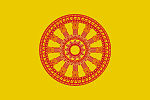
Eine Arbeiterin, die überlebt, führt das auf ein Amulett des Wundermönchs Luang Phor Khoon Parisuttho (หลวงพ่อคูณ ปริสุทโธ, 1923 - ) zurück. Luang Phor Khoon ist Abt von Wat Ban Rai (วัดบ้านไร่), Amphoe Dan Khun Thot (ด่านขุนทด),
Abb.: Lage von Wat Ban Rai (วัดบ้านไร่)
[Bildquelle: OpenStreetMap. -- Creative Commons Lizenz (Namensnennung, share alike)]
"A young female worker at the Kader doll factory on the outskirts of Bangkok survived a leap from the factory’s third story while escaping a fire in which more than two hundred of her coworkers died. Twenty-one-year-old Phairat Jeemkhunthot, a native of Khoon’s [Khun's] home district of Dan Khun Thot [ด่านขุนทด], survived the leap while other escaping workers who jumped with her died. She later told the reporters that as she jumped, she had held on to her Luang Phor Khoon [หลวงพ่อคูณ ปริสุทโธ, 1923 - ] amulet, struck in 1987, called the cooperative batch (run sahakon [รุ่นสหกรณ์์]). Apparently Phairat’s fall was cushioned by the bodies of colleagues who had leapt before her and on whom she landed. However, the popular Thai-language press attributed her survival to the miraculous power of the amulet. The 1987 cooperative’s batch of medallions has now become highly prized and expensive, with a thriving market in forgeries." [Quelle: Jackson, Peter: The enchanting spirit of Thai capitalism : the cult of Luang Phor Khoon and the Post-Modernization of Thai Buddhism. -- IN: South East Asia research 7,1 (1990-03). -- Zitiert in: Pattana Kitiarsa [พัฒนา กิติอาษา] <1968-2013>: Mediums, monks, and amulets : Thai popular Buddhism today. -- Chiang Mai : Silkworm, [2012]. -- 170 S. : Ill ; 21 cm. -- ISBN 9786162150494. -- S. 91f.]
1993-05-13
Nach einer Woche von Demonstrationen von Bauern gegen niedere Reispreise, beschließt die Regierung, Reis aus der zweiten Ernte zu einem höheren Preis aufzukaufen. Die Demonstrationen waren von der Provinz Kamphaeng Phet (กำแพงเพชร) ausgegangen und breiteten sich von dort bis nach Bangkok aus. Die Bauern waren teilweise gewalttätig und mit Stöcken, Steinen, Steinschleudern und Molotow Cocktails bewaffnet. Ein Bauer stirbt an seinen Verletzungen. Mehrere Polizisten werden verletzt.
Abb.: Lage der Provinz Kamphaeng Phet (กำแพงเพชร)
[Bildquelle: OpenStreetMap. -- Creative Commons Lizenz (Namensnennung, share alike)]
1993-05-22
Premiere des Films Salween (มือปืน 2 สาละวิน) von Prinz Chatrichalerm Yugala (หม่อมเจ้าชาตรีเฉลิม ยุคล, 1942 - ).
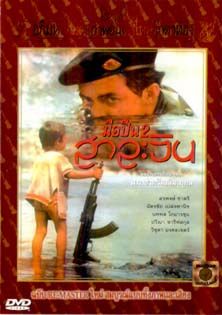
Abb.: DVD-Cover
[Bildquelle: Wikipedia. -- Fair use]
|
"Salween (Thai: มือปืน 2 สาละวิน, RTGS: Muepuen 2 Sarawin) is a 1994 Thai action-drama film directed by Chatrichalerm Yukol (หม่อมเจ้าชาตรีเฉลิม ยุคล, 1942 - )and starring Sorapong Chatree (สรพงษ์ ชาตรี, 1950 - ) and Chatchai Plengpanich (ฉัตรชัย เปล่งพานิช). Sombat Metanee's (สมบัติ เมทะนี, 1937 - ) son, Siricoup Metanee (สิรคุปต์ เมทะนี), also stars as a young police lieutenant, newly arrived at a rough-and-tumble post in a Thai-Myanmar border town on the Salween River (သံလွင်မြစ်/แม่น้ำสาละวิน). The screenplay is co-written by Chatrichalerm and Stirling Silliphant (1918 - 1996). PlotA text scroll at the opening of the film gives some historical background about Myanmar (or Burma) being granted independence after World War II by the United Kingdom, without the problem of ethnic conflict with the Karen people (กะเหรี่ยง) on the country's border areas being resolved. So since then, the Burmese central government, then known as SLORC (နိုင်ငံတော် အေးချမ်းသာယာရေး နှင့် ဖွံ့ဖြိုးရေး ကောင်စီ) and the Karen National Liberation Army (ကရင်အမျိုးသား လွတ်မြောက်ရေး တပ်မတော်) have been engaged in a war that is little known to outside people. A Thai timber baron, Tweepong, exploits the situation by courting both the KNLA and SLORC in order to have the unrest continue while his company logs the teak forests in the border region of the Salween River. Into this volatile, "wild west" atmosphere comes a young, idealistic police lieutenant, Danai, who's to take charge of the police station at the border town of Fah Soong Pha Sak. He rides into town on his motorcycle as a gun battle has erupted between the police, led by tough Sergeant Ram, against some gun thugs. Danai, wearing his crisp police uniform, ends up dumped in a pig pen, covered in mud. He then gives the unkempt, undisciplined local policemen a dressing down, saying they all must clean up and wear their uniforms. The gunmen who started the fight had been sent to kill Ram by Somsak Tweepong, son of the local "godfather". Somsak later visits Danai to invite him to his father's birthday party. Eager to carry out his duties, Danai starts a foot patrol of his mountainous district and finds that his tight brown uniform and new boots are unsuited to the rugged terrain. While sitting down to rest and care for some blisters on his feet, he encounters a man nattily dressed in white clothes chasing butterflies with a net. The man is the elder Tweepong, who gives Danai some salve. After Danai leaves, Tweepong meets with a SLORC colonel and gains intelligence about the Myanmar government's fight against the Karen. Danai attends the birthday party for Tweepong, and meets Somsak's wife, who was a former beauty queen and actress from Bangkok. She is unhappily married to Somsak and has become an alcoholic. Danai continues his tour of the district, meeting Nid, who is a teacher at a school for Thai hill-tribe children. She is also the daughter of Sergeant Ram. Her mother was a Karen woman, who was raped and killed by Somsak Tweepong's men, hence the deep resentment Ram has against Tweepong. Further education comes for Danai when fighting between the KNLA and the SLORC spills over into Thailand. As Karen troops, led by KNLA Lieutenant Tulay, are being attacked by a SLORC helicopter, they attempt to wade the Salween River and cross over into Thailand. Danai at first orders Ram to turn the Karen back, but after seeing the helicopter gunship decimate the Karen, he relents, even growing so frustrated as to fire upon the helicopter, which then fires back. However, nothing more comes of this incident. But there is more drama in store, as Somsak discovers his wife having an affair. She accuses Somsak of being a homosexual, and Somsak grows enraged. His wife pulls out a gun, and Somsak tries to take it from her, shooting her in the process. She escapes and drives to the police station, where she dies after saying Somsak had shot her. Somsak is now a fugitive, hiding in Myanmar. Danai at first believes he must go through proper channels to extradite Somsak, but Ram convinces him otherwise, and they take a party into Myanmar to get Somsak back by force. Somsak's father makes a deal with the KNLA to give them Stinger missiles in exchange for saving his son. Tulay and his men sneak up on Danai's party at night, but let them live in exchange for saving their lives during the earlier incident at the river. Danai tells Tulay that Somsak had committed murder and must be brought back to Thailand for trial. "This is Kawthoolei. Thai laws have no meaning here," Tulay replies. The next morning, the Karen attack. Ram is fatally shot, but he is able to get off a shot that injures Tulay. Danai and the survivors, including Ram's daughter, take Somsak and head back to Thailand. Just as Danai and Nid are crossing a small river bridge back to Thailand, they come under attack again by Tulay, who, though injured, was waiting under the water just upstream to ambush them. However, then SLORC troops show up and shoot Tulay. The SLORC colonel says he has made a deal with Tweepong for Somsak, and orders Danai to drop his weapons. Tulay, though, is not yet dead. He floats downstream under the bridge and fatally shoots the colonel. Somsak then runs back towards Myanmar, but Nid still has her pistol. She hands it to Danai, who then shoots Somsak in the back to death. Cast
Towards the end of the film, the title track to the film, "Salween" is performed over scenes of the Salween River by Yuanyong Opakul (ยืนยง โอภากุล, 1954 - ) singer of the popular Pleng phua cheewit (เพลงเพื่อชีวิต - "songs for life") band, Carabao (คาราบาว), rhapsodizing the river and the people that live along it. Gunman series Salween was also entitled Gunman 2 (Thai: มือปืน 2, or Mue puen 2) as a followup to Chatrichalerm's 1983 film, Gunman (มือปืน). However, aside from the presence of Sorapong Chatree, who starred in the earlier film, as well as Ron Rittichai, the stories and characters of the two films have no relation, so Salween is a sequel to Gunman in name only. DVDA DVD of the film was released in Thailand on an all-region PAL disc with English subtitles by the Mangpong video retail chain." [Quelle: http://en.wikipedia.org/wiki/Salween_%28film%29. -- Zugriff am 2013-03-18] |
1993-05-31

Bangkok: Jacky Chan (aka Ong King Ee), 28, ein Führer der malaysischen Triade (三合會) Sio Sam Ong (小三王, Three Little Emperors), wird von der Polizei verhaftet und an Malaysia ausgeliefert.
1993-06-09

Japans Kronprinz Naruhito (皇太子徳仁親王, 1960 - ) heiratet die Bürgerliche Masako Owada (小和田 雅子, 1963 - )
Abb.: Kronprinz Naruhito (皇太子徳仁親王) (rechts) und Kronprinzessin Masako (皇太子妃雅子), 2011
[Bildquelle: Kounosu / Wikipedia. -- GNU FDLicense]
1993-06-12 - 1993-06-20
17th Southeast Asian Games in Singapur.
In der Gesamtwertung kommt Thailand (63 Gold- 70 Silber- 63 Bronze-Medaillen) auf Platz 2 nach Indonesien
Der Schwimmer Ratapong Sirasanont (รัฐพงศ์ ศิริสานนท์, 1976 - ) gewinnt sechs Medaillen, davon drei Goldmedaillen.
Das thailändische Fußball-Team gewinnt die Goldmedaille im Endspiel gegen Myanmar (4 : 3).
Abb.: Lage von Singapur
[Bildquelle: OpenStreetMap. -- Creative Commons Lizenz (Namensnennung, share alike)]
1993-07

Die Scheidung von Kronprinz Vajiralongkorn von Prinzessin Soamsawali (โสมสวลี, 1957 - ) wird rechtsgültig.
1993-07

Die USA schließen ihr Konsulat in Songkhla (สงขลา)
Abb.: Lage von Songkhla (สงขลา)
[Bildquelle: OpenStreetMap. -- Creative Commons Lizenz (Namensnennung, share alike)]
1993-07-03

Der neue
Longman dictionary of English language and culture / [editorial director, Della Summers]. -- Updated rept. -- Harlow, Essex, England : Longman, 1993. -- ISBN 0582086760
schreibt im Eintrag "Bangkok": Bangkok is "famous for its temples and other beautiful buildings and also often mentioned as a place where there are a lot of prostitutes."
Die thailändische Regierung protestierte beim Herausgeber des Wörterbuchs erfolglos.
Abb.: Einbandtitel
Abb.: Lage von Harlow, Essex
[Bildquelle: OpenStreetMap. -- Creative Commons Lizenz (Namensnennung, share alike)]
1993-07-08

In Chaiya (ไชยา) stirbt Buddhadasa Bhikkhu (พุทธทาสภิกขุ, geb. 1906).
Abb.: Lage von Chaiya (ไชยา)
[Bildquelle: OpenStreetMap. -- Creative Commons Lizenz (Namensnennung, share alike)]
Abb.: Buddhadasa Bhikkhu (พุทธทาสภิกขุ)
[Bildquelle: Courtesy of Santikaro / Wikipedia. -- GNU FDLicense]
"Buddhadasa Bhikkhu (Thai: พุทธทาสภิกขุ ausgesprochen: Put-ta-tahd Pik-ku, Geburtsname: Ngüam Panid (เงื่อม พานิช); * 27. Mai 1906 in Phumriang (พุมเรียง), Amphoe Chaiya, Südthailand; † 25. Mai 1993 in Chaiya) war einer der einflussreichsten buddhistischen Theravada-Mönche des 20. Jahrhunderts. Frühe Jahre
Buddhadasas ursprünglicher Name war Ngüam Panid (เงื่อม พานิช), er wurde am 27. Mai 1906 als ältester von drei Kindern in eine kleine Kaufmanns-Familie in Phumriang, einer kleinen Küstenstadt in der südthailändischen Provinz Surat Thani, geboren. Sein Vater hieß Sieng Panid, er war chinesischer Abstammung. Seine thailändische Mutter hieß Kluan Panid, beide betrieben einen kleinen Krämerladen, in dem Ngüam seine Kindheit verbrachte. Seine Mutter war eine tiefgläubige Buddhistin, sie lehrte ihn Verantwortung und die Kunst der Sparsamkeit. Sie wurde später einer der Hauptsponsoren des Wat Suan Mohk. In ihrer Jugend veranstalteten Ngüam und seine Brüder in der Nachbarschaft Diskussionen über buddhistische Themen.
Im Jahre 1926 wurde er traditionsgemäß und auf Wunsch seiner Mutter im Wat Mai in Phumriang zum Mönch ordiniert. Er bekam den Namen „Inthapanyo“ (der Weise). Bereits nach drei Tagen begann er, sich von den althergebrachten Konventionen zu lösen: anstatt den Laien aus den alten Schriften vorzulesen, versuchte der junge Mönch das Dhamma mit alltäglichen Ereignissen zu verbinden. Seine Art zu predigen wurden bald im ganzen Land bekannt, so dass die Predigt-Halle bald nicht mehr die vielen Leute aufnehmen konnte, die kamen, um ihm zuzuhören.
Innerhalb von zwei Jahren bestand er die Prüfungen für die beiden Grundstufen des Dhamma-Studiums (Thai: Nak Tham Tri und Nak Tham Tho). Auf Anraten seines Onkels Siang aus Chumpon zog er nach Bangkok, da er nur dort das Studium der Schriften vertiefen konnte. Inthapanyo hielt Bangkok zunächst für das „Land der Erwachten“, das Zentrum der Schriften und Gurus. Aber er wurde sehr schnell desillusioniert durch den Lärm und Dreck der Stadt, die überfüllten Tempel und die desinteressierten Mönche. Schon nach zwei Monaten war er so frustriert, dass er beinahe aus dem Mönchsorden ausgetreten wäre. Er kehrte in sein Heimatdorf zurück, wo er sich alleine das Wissen für die letzte Grund-Stufe des Studiums der alten Schriften aus Büchern beibrachte. Nach einem Jahr konnte sein Onkel ihn erneut überreden, in Bangkok das Studium der Pali-Sprache aufzunehmen. Diesmal war Inthapanyo gelassener, er konnte sich in eine ruhige Ecke zurückziehen und bekam dort Privatunterricht. Bald absolvierte er die Prüfung für die dritte Grundstufe, und wurde so ein „Phra Maha Parien“ (etwa: Pali-Gelehrter), wie er es sich gewünscht hatte.
Nach einem weiteren Jahr des Aufbau-Studiums, das er aber nur halbherzig betrieb, fiel er durch die Prüfung, was ihn endgültig davon überzeugte, der Großstadt den Rücken zuzuwenden und nach Phumriang zurückzukehren.
Gründung von Wat Suan MohkZu Zeiten des Gautama Buddha empfahl dieser seinen Schülern, in den Wald zu gehen und sich unter einen Baum zu setzen, um die letzte Wahrheit zu suchen. Genau dies wollte Inthapanyo tun. Mit Hilfe seines Bruders und einiger befreundeter Mönche fand er einen seit 80 Jahren verlassenen Tempel im Dschungel, der Wat Trapangjik genannt wurde.
Hier ließ er sich eine kleine Hütte bauen und zog im Mai 1932 dort ein. Er nannte diesen Tempel „Suan Mokkhabalarama (สวนโมกขพลาราม)“ (kurz: Suan Mohk), was so viel wie „Garten der Befreiung“ bedeutet. Im gleichen Jahr, nur einen Monat später stürzten Militärs in einem gewaltlosen Putsch den König von Thailand und errichteten eine konstitutionelle Monarchie, was Buddhadasa selbst als gutes Omen für seine Neugründung ansah.
In den ersten zwei Jahren im Suan Mohk hatte sich Inthapanyo einem Leben in völliger Abgeschiedenheit ergeben. Bis zu der Konsequenz, dass sein Bruder seine tägliche Mahlzeit am Waldrand an einen Baum zu hängen hatte, damit der Einsiedler keinem Menschen begegnen musste. Er verbrachte seine Zeit mit Meditation und dem Studium des Tipitaka, immer bestrebt, den Weg der Theravada-Waldmönche einzuhalten. Anhand der Tipitaka und eigenen praktischen Erfahrungen stellte er für die ernsthafte Meditation eine Schritt-für-Schritt-Anleitung zusammen, die er ins Thailändische übersetzte und „Folge den Fußspuren der Arahats“ nannte. Er veröffentlichte sie in dem Journal „Buddhasasana“ (Thai: Buddhismus), welches sein Bruder Dhammadasa herausgab, unter seinem neuen Namen „Buddhadasa“ (Diener des Buddha). Diesen Namen gab er sich in einem feierlichen Gelübde im August 1932: „Ich übergebe dieses Leben und diesen Körper dem Buddha. Ich bin ein Diener des Buddha, und der Buddha ist mein Gebieter. Daher werde ich fortan den Namen Buddhadasa tragen.“
In seinen späteren Jahren kamen viele ausländische Studenten in seinen Tempel, um seine Predigten zu hören und an zehntägigen Retreats teilzunehmen. Er hielt auch viele Gespräche mit Gelehrten der christlichen Kirche und auch anderer Religionen, in denen er immer betonte, dass in den Grundaussagen eigentlich alle Religionen gleich seien. Kurz vor seinem Tod im Jahre 1993 richtete er das International Dhamma Hermitage Center in der Nähe seines Tempels ein, um Nicht-Thai-Studenten eine Möglichkeit zu geben, die Lehren Buddhas und die Vipassana-Meditation zu studieren.
Buddhadasa starb am 25. Mai 1993 nach einer Serie von Herzanfällen und Herzschlägen bei der Vorbereitung einer Rede, die er zwei Tage später zu seinem Geburtstag halten wollte. Nachdem die Ärzte des Siriraj-Hospitals in Bangkok unter Protest seiner Freunde und Mitmönche wochenlang vergeblich versuchten, seine Gesundheit wiederherzustellen, stellten sie seinen physikalischen Tod am 8. Juli 1993 fest."
[Quelle: http://de.wikipedia.org/wiki/Buddhadasa. -- Zugriff am 2011-11-04]
1993-07-29
Die New Aspiration Party (พรรคความหวังใหม่) kommt ins Kreuzfeuer von Frauenrechtlerinnen, als bekannt wird, dass 30 bis 40 Abgeordnete der Partei sich bei einer Party von 20 Prostituierten "bedienen" ließen, die vom stellvertretenden Parteisekretär, Boonchu Trithong, verlost wurden.
1993-08 - 1994-04
Terroranschläge in den vier malaiisch-muslimischen Südprovinzen:
49 Brandstiftungen
4 Bombenanschläge auf Züge
1 misslungener Bombenanschlag auf einen Zug
2 größere Angriffe mit leichter Bewaffnung
viele Schusswechsel
viele Geiselnahmen
1993-08-01
In den malayisch-muslimischen Südprovinzen Yala (ยะลา), Pattani (ปัตตานี) und Narathiwat (นราธิวาส) werden 34 Schulen und Regierungsgebäude von Terroristen in Brand gesetzt. Die zunehmende Gewalt zwingt alle Grundschulen 20 Tage lang zu schließen. Im August wird auch ein Zug in die Luft gesprengt: ein Toter, neun Verletzte. Während der Abendrezitation wird eine Bombe in ein buddhistisches Kloster geworfen: neun verletzte Mönche. Ein Bus in Yala (ยะลา) wird angegriffen. Die Sicherheitskräfte werden verstärkt.
Abb.: Lage der Provinzen Yala (ยะลา), Pattani (ปัตตานี) und Narathiwat (นราธิวาส)
[Bildquelle: CIA. -- Public domain]
1993-08-06
ข่าวไทย (Thai News):
"Local police, border patrol, military dogs and helicopter mobilized in hunt for daring armed bandits Bandits armed with both guns and knives closed off the Mae Taeng River and robbed frightened tourists of various nations of over 100,000 baht and fled into the forest. Police using military dogs and a helicopter immediately began a hunt for the bandits. The provincial Governor ordered an immediate closure of rafting tours in the area until the situation improves. The incident occurred on the 4th of August 1993."
"Lahu [ชาวมูเซอ / ชาวล่าหู่] bandit apprehended, admits to robbery leader still at large
Police forces, in their hunt for Lahu bandits robbing foreign tourists, apprehended one of the group in the forest. At first, he refused to confess. However, when confronted by another member of the gang previously apprehended, he became pale and confessed. The leader was still in hiding. The police requested him to turn himself in or they would use extreme measures. It was recommended that guides request police protection on future tours. If there are future incidents the police recommended closing the jungles to tourism.
The third robbery . . . Three bandits armed with shotguns and knives held up tourists. The bandits spoke in the Lahu dialect and wore camouflage uniforms . . . Officials suspected that one of the three bandits involved was Mr. Mekka or Lo-ee of the Lisu Pankam gang, responsible for two other robberies of tourists in the same area."
"Although police officers have mounted land and air searches for the Mekka gang, they have always managed to escape and, thus, become bolder. They have even instructed a female guide to tell the authorities, "We're not worried about the police, not even their fathers."
At the central court in Chiangmai, Mr. Chanasak Yuwaboon [ชนะศักดิ์ ยุวบูรณ์], Chiangmai Governor, told reporters that this is the third robbery incident on the Mae Taeng River. The court has still not decided on the second incident. At present, this area has been closed to tourism, but will re-open if the situation improves."
[Übersetzt von Prasith Leepreecha [ประสิทธิ์ ลีปรีชา]. -- In: Development or domestication? : indigenous peoples of Southeast Asia / ed. Don N McCaskill ; Ken Kampe. -- Chiang Mai : Silkworm Books, 1997. -- 631 S. : Ill. ; 21 cm. -- ISBN 974-7100-33-9. -- S. 269f.]
1993-08-13
In Nakhon Ratchasima (นครราชสีมา) stürzt das Royal Plaza Hotel ein. 127 Tote, Hunderte Verletzte. Grund des Zusammensturzes unzureichende Statik. Das Hotel hatte beim Bau 1984 drei Stockwerke, wurde aber 1987 mit Baugenehmigung um drei weitere Stockwerke erhöht. Die Baugenehmigung war wahrscheinlich gegeben worden, ohne dass die ursprünglichen Baupläne eingesehen wurden.
Abb.: Lage von Nakhon Ratchasima (นครราชสีมา)
[Bildquelle: OpenStreetMap. -- Creative Commons Lizenz (Namensnennung, share alike)]

Viele Überlebende schreiben ihre Rettung Amuletten von des Wundermönchs Luang Phor Khoon Parisuttho (หลวงพ่อคูณ ปริสุทโธ, 1923 - ) zu. Luang Phor Khoon ist Abt von Wat Ban Rai (วัดบ้านไร่), Amphoe Dan Khun Thot (ด่านขุนทด) (siehe oben!). Luang Phor Khoon war .während den Rettungsarbeiten persönlich anwesend
"The anonymous biographer reports Luang Pho Khun’s miracle as follows:
Kung, the hotel cashier, was among the survivors who were rescued after being trapped inside the debris for two days. She could not move as her right arm was under the heavy concrete structure. She managed to survive in the minimal space between a big metal cabinet and concrete pillars. She was very weak by the time the rescue team dug into the debris. Two other hotel employees were also rescued from the same spot. All of the survivors suffered only minor injuries and fatigue. What these survivors had in common were amulets blessed by Luang Pho Khun [หลวงพ่อคูณ ปริสุทโธ]. They wore these medallions around their necks. Luang Pho Khun’s magical power saved their life. This was nothing less than a miracle, through which Luang Pho Khun’s fame and reputation was publicized and circulated to every corner of the country."[Quelle: Pattana Kitiarsa [พัฒนา กิติอาษา] <1968-2013>: Mediums, monks, and amulets : Thai popular Buddhism today. -- Chiang Mai : Silkworm, [2012]. -- 170 S. : Ill ; 21 cm. -- ISBN 9786162150494. -- S. 91.]
1993-08-24
Bangkok spielt verrückt wegen Michael Jacksons (1958 - 2009) zwei Konzerten. Als Jackson sein zweites Konzert wegen Dehydration verschiebt, schlägt die Begeisterung bei seinen Fans in Wut um.
Künstlerlink auf Spotify:
URI: spotify:artist:3fMbdgg4jU18AjLCKBhRSm
URL: https://open.spotify.com/artist/3fMbdgg4jU18AjLCKBhRSm
Abb.: Thailand hat kurze Zeit zwei Könige: "King of Pop" Michael Jackson, 1984
[Bildquelle: White House Photo Office / Wikipedia. -- Public domain]
1993-08-26

Tod von Kenneth Landon (1903 - 1993). Landon war 1927 - 1937 presbyterianischer Missionar in Siam. Ab 1941 bestimmte er maßgeblich als Regierungsbeamter die Politik der USA gegenüber Thailand.
1993-09-01 - 1999-09-01
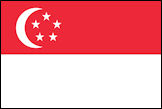
Ong Teng Cheong (王鼎昌 / ஓங் டெங் சியோங், 1936 - 2002) ist Präsident Singapurs.
1993-09-05
Tod der Schriftstellerin Subha Devakul na Ayuthaya (สุภาว์ เทวกุล ณ อยุธยา, 1928 - 2993). Sie war einige der wenigen Schriftstelelrinnen Thailands, die ihren Lebensuunterhalt durch Schriftstellerei verdiente.
Pseudonyme:
รจนา
ศิระ ส.
ส. สุภารัตน์
"Subha Devakul (also known as Supa Devaku) (1928 – 1993) was a Thai writer.[1] She was born in Bangkok and wrote her first fiction in high school. She married while still young, had five children and became a widow before the age of 30. Devakul began writing professionally to support herself and her family. She wrote forty novels, hundreds of short stories and numerous television scripts and screenplays. She was president of the Writer's Association of Thailand from 1978 to 1982. She played an important role in establishing the S.E.A. Write Award. Devakul died of lung disease.[1]
Selected works
- Yue Arrom (เหยื่ออารมณ์) Victim of lust), novel
- "When She Was a Major Wife", humorous story in The Lioness in Bloom: Modern Thai Fiction about Women (1996)"
Abb.: Einbandtitel[Quelle: https://en.wikipedia.org/wiki/Subha_Devakul. -- Zugriff am 2016-02-27]
1993-09-24

Norodom Sihanouk (នរោត្ដម សីហនុ) wird wieder (er war es schon von 1941 bis 1955) König von Kambodscha. Nach der neuen Verfassung ist Kambodscha eine konstitutionelle Monarchie. Sihanouk war in der Zwischenzeit 1960 bis 1970, 1975 bis 1976 und 1991 bis 1993 Staatschef von Kambodscha. Die UNO stationiert 22.000 Blauhelme in Kambodscha, die die Prostitution, Korruption und AIDS im Lande fördern, sonst aber keinerlei positive Funktion zu haben scheinen.
Abb.: Kambodscha
[Bildquelle: CIA. -- Public domain]
Abb.: König Norodom Sihanouk (នរោត្ដម សីហនុ), Siem Reap-Angkor International Airport (អាកាសយានដ្ឋានអន្តរជាតិសៀមរាបអង្គរ), 2003
[Bildquelle: Gryffindor / Wikimedia. -- Public domain]
Abb.: Lage des Siem Reap-Angkor International Airport (អាកាសយានដ្ឋានអន្តរជាតិសៀមរាបអង្គរ)
[Bildquelle: OpenStreetMap. -- Creative Commons Lizenz (Namensnennung, share alike)]
Abb.: United Nations Transitional Authority in Cambodia (UNTAC), 1993
[Bildquelle: UN Photo / John Isaac. -- http://www.flickr.com/photos/un_photo/3331241679/. -- Zugriff am 2011-12-13. -- Creative Commons Lizenz (Namensnennung, keine kommerzielle Nutzung, keine Bearbeitung)]
1993-10-02
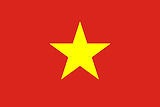
Sơn La Provinz, Vietnam: 53 Anhänger eines apokalyptischen Kults begehen Massenselbstmord. Alle sind Angehörige der Thai-Minorität Vietnams. Der Führer des Kults, Ca Van Lieng, hatte eine Weltuntergangsflut für das Jahr 2000 vorausgesagt. Bei der "Abschiedsparty" in Pehe im Distrikt Thuận Châu gibt der Kultführer allen Anhängern zwei Silbermünzen, ein Symbol für Tod bei Thais.
Abb.: Lage von Thuận Châu
[Bildquelle: OpenStreetMap. -- Creative Commons Lizenz (Namensnennung, share alike)]
1993-10-14
Im luxuriösen Imperial Hotel in Bangkok feiern über 500 Aktivisten der Studentenrevolution von 1973 die 20-Jahrfeier. Die meisten Teilnehmer sind inzwischen etablierte Akademiker, Politiker, Schriftsteller, Liedermacher oder Geschäftsleute.
1993-10-15
Es erscheint:
Kamol Sukin [กมล สุกิน]: Land rights issue stirs up a storm. -- In: The Nation <Bangkok>. -- 1993-10-15
"My colleague Kamol Sukin [กมล สุกิน] revealed how the Nimmanahaeminda [นิมมานเหมินท์] family, Chiang Mai’s [เชียงใหม่] wealthiest clan, had managed to obtain title to a seventeen-rai [= 27.200 m²] plot of land in Doi Suthep-Pui National Park [อุทยานแห่งชาติดอยสุเทพ-ปุย] and then lease it out to Juldis [จุลดิศ], a major development company, to build a resort there." [Quelle: Fahn, James David <1965 - >: A land on fire : the environmental consequences of the Southeast Asian boom. -- Boulder : Westview, 2003. -- 365 S. ; 24 cm. -- ISBN 0-8133-4267-8. -- S. 67. -- Fair use]
Abb.: Lage des Doi Suthep-Pui National Park [อุทยานแห่งชาติดอยสุเทพ-ปุย]
[Bildquelle: OpenStreetMap. -- Creative Commons Lizenz (Namensnennung, share alike)]
1993-11

Der Mönch Phra Phongthep Dhammagaruko (พงษ์เทพธมมครุโก) gründet in Chiang Mai das Friends for Life Center zur Pflege AIDS-Kranker.
1993-11
In einer Umfrage wird das Innenministerium (กระทรวงมหาดไทย) als unehrlichste und ungerechteste Behörde eingestuft.
Abb.: ®Logo
1993-11-10

Libyen weist die 10.000 Thai-Gastarbeiter aus, da Thailand die Anschuldigungen der USA unterstütze, dass Libyen Chemiewaffen herstelle. Muammar al-Gaddafi (معمر القذافي) (1942 - 2011): "They can go to Thailand. Let them go and get fed by America." Das thailändische Außenministerium betont, dass es Libyen nie der Herstellung von Chemiewaffen bezichtigt habe. Alles sei nur ein Missverständnis.
Abb.: Lage von Libyen
[Bildquelle: OpenStreetMap. -- Creative Commons Lizenz (Namensnennung, share alike)]
Abb.: Muammar al-Gaddafi, 2011
[Bildquelle: Maher A. A. Abdussalam / Wikimedia. -- Public domain]
Abb.: Muammar al-Gaddafi /von Murray Webb (1947 - ), 2011
[Bildquelle: [Colonel Gaddafi]. 22 February 2011. Webb, Murray, 1947- :[Digital caricatures published from 29 July 2005 onwards (2006, 2007, 2008). Includes a selection of digital caricatures published from 2002 and up to July 2005.]. Ref: DCDL-0017129. Alexander Turnbull Library, Wellington, New Zealand. http://natlib.govt.nz/records/22702990. -- Zugriff am 2013-03-09. -- "You can copy this item for personal use, share it, and post it on a blog or website. It cannot be used commercially without permission"]
1993-11-15 - 1993-11-24
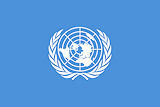
In den UN Regional Headquarters in Bangkok treffen sich Vertreter der 127 Länder, die die Vienna Convention for the Protection of the Ozone Layer (1988) und das Montreal Protocol on Substances That Deplete the Ozone Layer (1987) zu beraten.
Abb.: Ausdehnung des Ozonlochs über dem Südpol von 1957 bis 2001
[Bildquelle: RedAndr / Wikipedia. -- GNU FDLicense]
1993-11-17

Auf Einladung von US-Präsident Clinton treffen sich in Seattle (USA) die Regierungschefs der 17 Mitgliedsstaaten der APEC (Asia-Pacific Economic Cooperation). Wichtigster Tagungspunkt ist der Abbau von Handelsschranken.
Mitgliedsstaaten der APEC bis 1993 Mitglied seit Australien 1989 Brunei 1989 Kanada 1989 Indonesien 1989 Japan 1989 Südkorea 1989 Malaysia 1989 Neuseeland 1989 Philippinen 1989 Singapur 1989 Thailand 1989 Vereinigte Staaten 1989 Taiwan 1991 Hongkong 1991 China 1991 Mexiko 1993 Papua-Neuguinea 1993
Abb.: Lage von Seattle (USA)
[Bildquelle: OpenStreetMap. -- Creative Commons Lizenz (Namensnennung, share alike)]
1993-11-19

Ministerpräsident Chuan trifft in Seattle (USA) US-Präsident Bill Clinton. Chuan fordert, dass Thailand alle Handelprivilegien behält und keinen Handels-Sanktionen unterliegen darf.
1993-11-23
The Nation <Bangkok> zitiert den Architekten ML Chainimit Navarat [ชัยนิมิตร นวรัตน]:
"I was shocked at the way the bungalows were managed. Tourism, sold stupidly, can be destructive, just like on Koh Samet [เกาะเสม็ด] or Koh Phi Phi [เกาะพี
พี ]. We have sold farang [ฝรั่ง] all of our national resources, very cheap. . . . There was no garbage dumpsite [at Phra Nang {พระนาง}]. I was not making enough to conserve the environment. My theory is that natural resources should be maximized. Why not bring it to the highest value and sell it at a reasonable price? But I didn’t want to do it with farang. We’ve lost many good places to farang in Phuket. So I turned to [Thai-owned] Premier. . . . Now I sell the property at the highest price. Okay, it is a haven for the rich. But does Thailand have a right to have a haven for the rich? [Natural resources] are not only for the poor."Chainimit is bitterly resentful of journalists, particularly Ing [Kanjanavanit - สมานรัชฎ์ "อิ๋ง" กาญจนะวณิชย์, 1959 -], whom he verbally threatened in front of a couple of Nation reporters:
"[Other powerful people’s] land has smaller-sized coconut trees than my land. You put my name on the thieves’ list. The real thieves just smile, they are not touched.... You have the power of the pen. Be careful. Or the pen could stab other people. If anything comes up, I’m coming straight for you.""
[Quelle: Fahn, James David <1965 - >: A land on fire : the environmental consequences of the Southeast Asian boom. -- Boulder : Westview, 2003. -- 365 S. ; 24 cm. -- ISBN 0-8133-4267-8. -- S. 71f. -- Fair use]
Abb.: Lage von Phra Nang {พระนาง}
[Bildquelle: OpenStreetMap. -- Creative Commons Lizenz (Namensnennung, share alike)]
1993-12-01
Schaffung von drei neuen Provinzen:
- Sa Kaeo (สระแก้ว), bisher zu Prachinburi (ปราจีนบุรี)
Amnat Charoen (อำนาจเจริญ), bisher zu Ubon Ratchathani (อุบลราชธานี)
- Nong Bua Lamphu (หนองบัวลำภู), bisher zu Udon Thani (อุดรธานี)
Abb.: Lage der drei neuen Provinzen
[Bildquelle: CIA. -- Public domain]
1993-12-02 + 1993-12-06
Es erscheinen:
Fahn, James David <1965 - > ; Klomjit Chandrapanya [จันทรปัญญา]: Si Chang deeds throw doubt on port plans. -- In: The Nation <Bangkok>. -- 1993-12-02
Dies.: On shaky grounds. -- . -- In: The Nation <Bangkok>. -- 1993-12-06
"Klomjit Chandrapanya and I worked on a dispute involving land owned by a company called Si Chang Thong Terminal and slated to become a controversial 10-billion-baht industrial port in Chonburi [ชลบุรี] province. We discovered that all the original proof-of-land-use documents, on which the title deeds are based, were reported missing by the owners and the Land Department—a suspiciously common occurrence in land scandals. In each of the above cases, the landowners and developers denied any wrongdoing. None was ever punished or even brought to trial." [Quelle: Fahn, James David <1965 - >: A land on fire : the environmental consequences of the Southeast Asian boom. -- Boulder : Westview, 2003. -- 365 S. ; 24 cm. -- ISBN 0-8133-4267-8. -- S. 67. -- Fair use]
1993-12-04

Tod von Margaret Landon (geborene Margaret Dorothea Mortenson, 1903 - 1993)
"Margaret Landon (* 7. September 1903 in Somers, Wisconsin, als Margaret Dorothea Mortenson; † 4. Dezember 1993 in Alexandria, Virginia) war eine US-amerikanische Schriftstellerin, die vor allem durch ihren Roman Anna und der König von Siam über das Leben von Anna Leonowens (1831 - 1915) berühmt wurde. Sie war eine von drei Töchtern in einer streng gläubigen Methodistenfamilie. Diese zog dann nach Evanston, Illinois, wo sie die High School besuchte. 1925 machte sie ihren Abschluss auf dem Wheaton College in Wheaton, Illinois. Sie unterrichtete ein Jahr lang und heiratete dann Kenneth Landon, den sie in Wheaton kennengelernt hatte. 1927 gingen beide als presbyterianische Missionare nach Thailand.
Landon hatte drei Kinder und leitete eine Missionarsschule in Trang (ตรัง). Sie las sehr viel über das Land und informierte sich über Anna Leonowens. Als die Familie 1937 nach Amerika zurückkehrte, begann sie zu schreiben. 1942 zog sie nach Washington, D.C., als ihr Mann sich entschloss, dem Staatsministerium als Südostasien-Berater beizutreten.
Ihr Roman über Leonowens wurde nach seiner Veröffentlichung 1944 sofort ein Bestseller. Eine spätere Arbeit über ihre eigenen Erfahrungen, Never Dies the Dream von 1949, hatte jedoch nicht annähernd so viel Erfolg."
[Quelle: https://de.wikipedia.org/wiki/Margaret_Landon. -- Zugriff am 2014-04-14]
1993-12-05

In seiner Geburtstagsrede fordert der König, dass bis zu seinem 72. Geburtstag (1999) drei neue Wasserkraft-Staudämme fertiggestellt werden:
Pa-Sak-Chonlasit-Staudamm (เขื่อนป่าสักชลสิทธิ์), Eröffnung 1999
Khlong Tha Dan Damm (เขื่อนคลองท่าด่าน), später umbenannt in Khun Dan Prakan Chon Damm (เขื่อนขุนด่านปราการชล), eröffnet 2005
Pak Phanang Diversion Dam (ประตูระบายน้ำปากพนัง), eröffnet 2002
Abb.: Lage des Pa-Sak-Chonlasit-Staudamms (เขื่อนป่าสักชลสิทธิ์)
[Bildquelle: OpenStreetMap. -- Creative Commons Lizenz (Namensnennung, share alike)]
Abb.: Pa-Sak-Chonlasit-Staudamm (เขื่อนป่าสักชลสิทธิ์), 2014
[Bildquelle: Supanut Arunoprayote / th.Wikipedia. -- Creative Commons Lizenz (Namensnennung, share alike)]
Abb.: Lage des Khun Dan Prakan Chon Damms (เขื่อนขุนด่านปราการชล)
[Bildquelle: OpenStreetMap. -- Creative Commons Lizenz (Namensnennung, share alike)]
Abb.: Khun Dan Prakan Chon Damm (เขื่อนขุนด่านปราการชล), 2010
[Bildquelle: Kawpodmd / Wikimedia. -- Creative Commons Lizenz (Namensnennung, share alike)]
Abb.: Lage des Pak Phanang Damms (ริมเขื่อน แม่น้ำปากพนัง)
[Bildquelle: OpenStreetMap. -- Creative Commons Lizenz (Namensnennung, share alike)]
1993-12-18
Der erste thailändische Rundfunk- und TV-Satellit "Thaicom 1" (ไทยคม 1) wird in Französisch-Guayana in Anwesenheit von Prinzessin Sirindhorn (มหาจักรีสิรินธร) in die Erdumlaufbahn geschossen.
Abb.: Lage von Französisch-Guayana
[Bildquelle: OpenStreetMap. -- Creative Commons Lizenz (Namensnennung, share alike)]s
1993-12-30

Der König spendet 1 Mio. Baht für den Bau einer neuen Straße, um den Stau auf Bangkoks Straßen zu verringern. Seit August hat der König ca. 13 Mio Baht gespendet, hauptsächlich für Ausrüstung und Personal von Bangkoks Verkehrspolizei.
Abb.: Verkehr Bangkok 1992
[Bildquelle: Dan Lundberg. -- http://www.flickr.com/photos/9508280@N07/5071702101/. -- Zugriff am 2014-11-01. -- Creative Commons Lizenz (Namensnennung, share alike)]
1993-12-30
Manoon Roopkachorn (พลตรี มนูญกฤต รูปขจร, 1935 - ) wird von der Anklage frei gesprochen, 1982 einen Mordanschlag auf Königin Sirikit, den früheren Ministerpräsidenten Prem Tinsulanond (เปรม ติณสูลานนท์) und den früheren Armeechef Gen Arthit Kamlangek (พลเอก อาทิตย์ กำลังเอก) geplant zu haben.
Abb.: Manoonkrit Roopkachorn (พลตรี มนูญกฤต รูปขจร)
[Bildquelle: th.Wikipedia. -- Fair use}
"Major General Manoonkrit Roopkachorn (พลตรี มนูญกฤต รูปขจร, born Manoon Roopkachorn, 13 December 1935 in Ayutthaya province - อยุธยา) is a former Thai military officer, Senator and Speaker of the Senate. A leader of the "Young Turks" clique of military officers, he took part in the coups of 1976 and 1977, the unsuccessful coups of 1981 and 1985, and 2002 corruption case of Prime Minister Thaksin. Early life and career
Manoon graduated from the Chulachomklao Royal Military Academy (โรงเรียนนายร้อยพระจุลจอมเกล้า) in its 7th Class, along with classmates Sanan Kachornprasart (สนั่น ขจรประศาสน์), Chamlong Srimuang (จำลอง ศรีเมือง), and Pallop Pinmanee (พัลลภ ปิ่นมณี).
Attempted coup of 1981Important military factions in the early 1980s included the Young Turks; the fifth class of the Chulachomklao Royal Military Academy led by Suchinda Kraprayoon (สุจินดา คราประยูร); the "Democratic Soldiers", mostly staff officers in counter-insurgency planning; and the military leadership, such as Generals Arthit Kamlangek (อาทิตย์ กำลังเอก) and Pichit Kullavanij, both with close ties to the palace, and Chaovalit Yongchaiyuth (ชวลิต ยงใจยุทธ), a loyalist to Prime Minister General Prem Tinsulanonda (เปรม ติณสูลานนท์).[1] The Young Turks were increasingly frustrated by the military leadership, which they claim had "allowed themselves to be subservient to the rotten political system just to live happily with benefits handed to them by (corrupt) politicians."[2]
On 1 April 1981, the Young Turks took over Bangkok in a bloodless coup of overwhelming military force, without the pre-approval of King Bhumibol Adulyadej.[1] The Thai royal family immediately fled to Korat province (โคราช)) along with Prime Minister Prem Tinsulanonda. With royal support for the Government made clear, Arthit Kamlangek led troops loyal to Chaovalit Yongchaiyuth and Chulachomklao Royal Military Academy Class 5 in a bloodless counter-coup that recaptured the capital. The coup later became known as the April Fool's Day Coup or the Mesa Hawaii (Thai: เมษาฮาวาย) Coup.
Attempted coup of 1985On 9 September 1985, the Young Turks again unsuccessfully attempted to topple the government of General Prem, although Prem was abroad at the time. Led by Manoon and his brother, Wing Commander Manas Roopkachorn, he was supported by former Prime Minister Kriangsak Chomanan, former Supreme Commander General Serm Na Nakhon, former Army chief General Yos Thephasdin, former Air Force chief Marshall Krasae Satharat and former Air Force chief Marshall Arum Promthep.[3] The pre-dawn coup consisted of several hundred men and twenty-two tanks. Within 10 hours, government troops led by General Chaovalit Yongchaiyuth quelled the bloody rebellion. There are 59 injuries, 5 casualties, 2 of them foreign journalists. Over 40 active and former military officers were arrested. Exiled pyramid scheme operator Ekkayuth Anchanbutr (เอกยุทธ อัญชันบุตร) was widely cited as a financier of the coup, leading some to call the coup the "Share Rebellion".[4][5]
Return to ThailandManoonkrit returned to Thai politics in the mid-1990s as an advisor to classmate Maj. Gen. Sanan Kachornprasart (สนั่น ขจรประศาสน์) of the Democrat Party.[6]
Senator and Senate SpeakerManoonkrit ran for the seat of Senator of Saraburi province (สระบุรี)) in 4 March 2001. He won 140,000 votes, but was disqualified after being accused of buying votes. Manoonkrit won again in the second round of voting on 29 April.[7] His victory was later endorsed due to lack of evidence of fraud.[8]
Manoonkrit won a majority 114 votes in a secret ballot over three other candidates for Speaker of the 200-member Senate.[6]
Thaksin's 2002 Corruption CaseSenate Speaker Manoonkrit, citing a petition signed by some 60,000 people, forwarded a formal request to the National Counter Corruption Commission (NCCC, คณะกรรมการป้องกันและปราบปรามการทุจริตแห่งชาติ) to investigate four Constitution Court (ศาลรัฐธรรมนูญ) judges — Kramol Thongdharmachart, Phan Chanpan, Sak Techacharn and Jumpol na Songkhla — in connection with their rulings on the asset-concealment case against the Prime Minister, Thaksin Shinawatra (ทักษิณ ชินวัตร), which then triggered major legal questions and a constitutional paradox. President Uthai Pimchaichon, who was also speaker of the House of Representatives (สภาผู้แทนราษฎร), asked the Constitution Court to block the investigation launched by the NCCC. "Apart from the tough questions of whether the NCCC was empowered to investigate Constitution Court judges, and whether the court could stop such a probe, the country was threatened with parallel showdowns between key political institutions - NCCC versus the Constitution Court and the Senate versus the House of Representatives. The Administrative Court was also dragged into the fray, following a petition by three of the investigated judges."[9]
Announced resignationOn May 20, 2003, Manoonkrit announced his resignation from the posts of Senator and Speaker effective on January 4, 2004, after some members of the upper house tried to force him to step down following a debate calling for an evaluation of his performance. His opponents said he made a promise, during his campaign, to stay in post for two years, so he decided to step down two years before his terms expired in 2006.[10]
Footnotes
- Thailand: Military Intervention and the Politics of Authoritarian Domination
- Chai-Anan Samudavanija, "The Thai Young Turks", p. 31, from an address to Manoon's Young Turk followers, 27 June 1980
- Timeline of modern Thai history
- Thai-language newspaper headlines, 20 September 2004
- หนุ่มแนว, ย้อนรอย มนูญกฤต รูปขจร เบื้องหลังกลุ่มพันธมิตร, 3 มีนาคม 2006
- Kyodo News International, "Former coup-maker elected Thai Senate president"
- Julian Geering, "Power Of The Ballot", Asiaweek, 12 May 2000
- Asiaweek, 19 May 2000
- Phairath Khampha (27 April 2002). "Thailand's National Counter Corruption Commission Agrees to Probe Judges in Prime Minister Thaksin's Corruption Case". ARCHIVE by GEOCITIES.WS expires Monday, September 12, 2011 11:50:43 AM. The Penguin Star. Archived from the original on 19 November 2009. Retrieved 14 July 2011. "followed a formal request from Senate Speaker Manoonkrit Roopkachorn, who acted on a petition signed by some 60,000 people."
- Akeamorn Threekrutphan (May 2003). "May 2003 : October 14 to be Democracy Day" (text/html). modified Thursday, July 14, 2011 7:51:34 AM. Institute of Public Policy Studies. Retrieved July 14, 2011. "Last but not least, Senate Speaker Manoonkrit Roopkachorn announced his resignation effective on January 4."
[Quelle: http://en.wikipedia.org/wiki/Manoonkrit_Roopkachorn. -- Zugriff am 2011-12-08]
1993-12-31

Tod von Lauriston Sharp (geb. 1907)
"Lauriston Sharp (March 24, 1907 – December 31, 1993) was a Goldwin Smith Professor of Anthropology and Asian Studies at Cornell University. He was the first person appointed in anthropology at the university, and he created its Southeast Asia Program, research centers in Asia and North and South America, a multidisciplinary faculty and strong language program. He was a founding member of the Society for Applied Anthropology and a founding trustee of the Asia Society. Early life and education
Sharp was born in 1907 in Madison, Wisconsin, where he grew up. His father was a professor of philosophy at the University of Wisconsin–Madison. Sharp attended this same institution, studying for a Bachelor of Arts (BA). While majoring in philosophy, Sharp went with friends Clyde Kluckhohn (1905 - 1960) and John J. Hanks on summer treks to archaeological sites on the Kaiparowitz Plateau in Arizona and Utah. These expeditions sparked his interest in the concrete, culturally informed anthropologist's perspective on human nature, in contrast to the more abstract, universalizing view of a philosopher.
After graduating with his BA in 1929, Sharp identified anthropology and Southeast Asian studies as his career focus. He encountered Berber culture while on an expedition to Algeria in 1930 with the Beloit-Logan Museum. Sharp moved to Austria to study Southeast Asian Ethnology under Robert Heine-Geldern (1885 - 1968), receiving the Certificate in Anthropology from the University of Vienna in 1931. He enrolled in the PhD program at Harvard University in 1932 and completed his thesis in 1937, after two years of fieldwork studying Australian Aborigines.
Marriage and familySharp married Ruth Burdick, and they had a family. She contributed to the Bennington-Cornell Thailand Project with expertise in anthropology and ceramics. They had a son named Alexander and a daughter named Suki.
Academic careerProfessor Sharp began teaching at Cornell in 1936; he was the university's first appointment in anthropology. He remained devoted to Cornell, creating and directing programs, and teaching at and remaining connected with the university for 56 years. He remained active as the Goldwin Smith Professor Emeritus, even after his formal retirement in 1973.
During an appointment at the State Department in 1945 and 1946, Sharp was an assistant division chief for Southeast Asian affairs. Upon returning to Cornell, Sharp oversaw the expansion of the anthropology program, making it a leading center for graduate training and research. His vision of anthropology was to emphasize an applied orientation and focus on area studies. He established Cornell research centers in South and Southeast Asia and North and South America.
In 1947, Sharp began the Cornell-Thailand Project, a ground-breaking initiative to collate baseline data in a comprehensive study of a farming village (Bang Chan) on the outskirts of Bangkok. Sharp also founded and was the first director between 1950 and 1960 of Cornell's Southeast Asia Program, for which he recruited a multi-disciplinary faculty, developed a strong language program and started what become the foremost library resource on South East Asia.
Sharp provided for scholars from the areas studied to receive training in such programs, in addition to hundreds of Western scholars. He chaired the Cornell Faculty Committee, which in 1961 saw the creation of the university's Center for International Studies. Aside from realizing Sharp's longtime dream of Southeast Asian research, the Thailand project also marked the start of his collaboration with Lucien Hanks and Jane Hanks of Bennington College. This continued in the Bennington-Cornell Project started in 1963, which entailed a broad regional survey of the upland and lowland peoples of northern Thailand. His wife, Ruth Burdick Sharp, contributed her acquired expertise in anthropology and ceramics to this project.
Despite health problems which made field research difficult after retirement, Sharp maintained his activity at Cornell and abroad. He worked with his research documents on Thailand as well as on Australian Aborigines.
Publications and organizationsSharp's professional career spanned wide geographical areas. As a scholar-researcher, he studied indigenous cultures on four continents. Several of his publications became classics in their fields: Steel Axes for Stone-Age Australians (1952), People Without Politics (1958), and Cultural Continuities and Discontinuities in Southeast Asia (1962). A number of his coauthored works exhibited his multidisciplinary research and interest in culture change, such as Siamese Rice Village (1953) and Bang Chan: Social History of A Rural Community in Thailand (1978). Sharp had a reputation for passion in passing on his experiences to future generations.
Sharp was president of the Association for Asian Studies from 1961 to 1962. He was a founding member of the Society for Applied Anthropology and a founding trustee of the Asia Society. He served on the governing boards of the American Anthropological Association and the Siam Society.
He won Guggenheim, Fulbright, and National Endowment for the Humanities fellowships. Upon retiring, he was presented with a two-volume festschrift, one celebrating his contributions to studies of cultural change and applied anthropology, the other recognizing his contributions to Thai studies.
He died at the age of 86 at his Ithaca, New York home on December 31, 1993.
Major works
- Steel Axes for Stone-Age Australians (1952)
- People Without Politics (1958)
- Cultural Continuities and Discontinuities in Southeast Asia (1962)
Co-authored:
Legacy and honors
- Siamese Rice Village (1953)
- Bang Chan: Social History of A Rural Community in Thailand (1978)[1]
- 1989, the Bronislaw Malinowski Award of the Society of Applied Anthropology."
[Quelle: http://en.wikipedia.org/wiki/Lauriston_Sharp. -- Zugriff am 2014-10-17]
ausführlich: http://www.payer.de/thailandchronik/ressourcen.htm
Zu Chronik 1994 / B. E. 2537. -- 1. undatiert